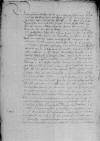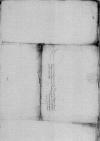Uns sein vor etzlichen tagen konigliche brieffe an die hern prelaten, woywoden und castellanen dieser lande geschrieben / bey ⌊koniglicher maiestet⌋, unsers allergnedigisten herren, kemmerer zukommen, die den ⌊herren rethen⌋, so der ⌊tag⌋ zum ⌊Elbing⌋ wer gehalten, solten sein uberantwort worden. So solchs nachgeblieben, / haben wir dieselbten brieffe an die ⌊hern rethe⌋ mit eigenem botten umbgeschickt und yren rath und gut duncken, / was in den sachen bei Ewer Erbarkeit zuthun, mit unsern schriften gefurdert, woruf uns eintrechtiglich schreiben von in widderumb ist worden, / das wir in irer aller nahmen Ewer Erbarkeit solcher koniglichen brieffen unnd befelich abschrifft zufertigen solten, / dobei unser und yre meynung, rath und willen, nemlich in der muntz handelung, Ewer Erbarkeit lassen wissen. Dieweil uns dan von wegen des presidents titel anders nicht wil geburen, dan ins erst ⌊koniglicher maiestet⌋ gebott und der ⌊herren rethe⌋ angeben nachzusetzen, sein wir der zuvorsicht, Ewer Erbarkeit werde uns solchs zur freuntlickeit deuten.
Es haben sich Ewer Erbarkeit wol zuerynnern, wie vil mall [u]ns der hamer gelegt wurde, / scharffe mandat an Ewer Erbarkeiten von ⌊koniglicher maiestet⌋, unserm allergnedigisten herren, sein kommen, aber nye heftiger also dis gegenwertige, wie Ewer Erbarkeiten aus der copei hie bei gelegt haben zuvorstehen. Derwegen ist der ⌊herrn rethe⌋ und unser trawhertziger rath und meynung, dieweil die herren negst und wir in sonderheit uf Ewer Erbarkeit durch den edlen, ernvhesten hern ⌊Hansen von Werden⌋, Ewer Erbarkeit mittels bürgermeisters etc. erbitten unbeschwert vor Ewer Erbarkeit ⌊koniglicher maiestet⌋ geschrieben, und bedunckt sie und uns das beste zu sein, das Ewer Erbarkeit von weiter zu muntzen vor sancti Stanislai negstkunfftigem tage gentzlich abstunden und von sich selbst / wie gutwillig den hamer nigerlegten, und das Ewer Erbarkeit solchs zuthun koniglicher maiestet, oder aber durch uns zuschrieben, / dorzu wir unsern botten uf unser unkost williglich und gerne wollen geschickt haben, dobei auch Ewer Erbarkeit bystes an konigliche maiestet und etliche ⌊herren der Cron⌋ wissen und werben. So dis, wie die ⌊herren⌋ und wir rathen und vor gutt ansehen, Ewer Erbarkeit werden ... und ⌊koniglicher maiestet⌋ willen und gebott nachkommen, wirt doraus Ewer Erbarkeit und der guten ⌊stadt⌋ vil gnad und gunst, auch allenthalben freundtschafft in der ⌊Cron⌋ und ⌊hie im lande⌋ erfolgen und zuwachssen. Es wurde auch ⌊koniglicher maiestet⌋ uf der ⌊herren⌋ und unser vorbitt, wie wir negst bei Ewer Erbarkeit secretarien magistro Georgio gerne gethan, zuhulf des ausbruchs mit nachlassung der hinderstelligen ...sen williger und gneigter werden. Ewer Erbarkeit feindt ⌊Zelislawski⌋ wurde auch weniger beistandt und vorhaltung mugen haben, / und wurden Ewer Erbarkeit mit ein dester fuglicher zu begertem ende kommen / und dergestalt bei ydermanniglich gebilliget gefurdert, geliebt und geehret werden etc. Blieb aber die muntz im gange und ⌊koniglicher maiestet⌋ ernstlich bevelh / und hie der ⌊herren⌋ getreuen rath und meinung unechtlich gelassen, haben Ewer Erbarkeit zue...cken, was nachteils und schaden aus eigenem nutz dem gemeinen muste erstehen, / der koniglicher maiestet, der ⌊Cron⌋ und diesem lande in keinen weg ist lenger zuvortragen und dulden. Woraus widder Ewer Erbarkeit ungnad, ungunst, verfolgung mancherlei widerwertigheit sich heslich wurden entporen, / und der ⌊feindt⌋ geweltiger widder Ewer Erbarkeit durch zuschub und hulff von allen seiten gesterckt, auch / das, Gott vorhutt, / grosserer schade und vorderbnis, weil dan der muntzen nutz einbrengt, / erhalten. / Es mochte auch ins endt das vorgenommen werden, das der ⌊stadt⌋ privilegien undergang gebe, / wie die recht sagen, / der vorleust sein priuilegium, der es misbraucht. Was das vorbott des ausschiffens angehet, / dieweill wir gestriges tages im beigelegtem brieffe dovon geschriben / und Ewer Erbarkeit sich darzu nicht bekennen, lasse wirs uf Ewer Erbarkeit vorantwortunge beruhen. Dis alles, wie es die hern prelaten, woywoden und castellan, den wir auch beifallen, / schriftlich an Ewer Erbarkeit zustellen von uns haben begert, / hat uns nicht wolt von ampts wegen gezymen solchs Ewer Erbarkeit, die uns durch diesen unsern botten beschlieslich wolten beantworten, zuvorhalten, die wir Gote in sein gnad befelhen.



